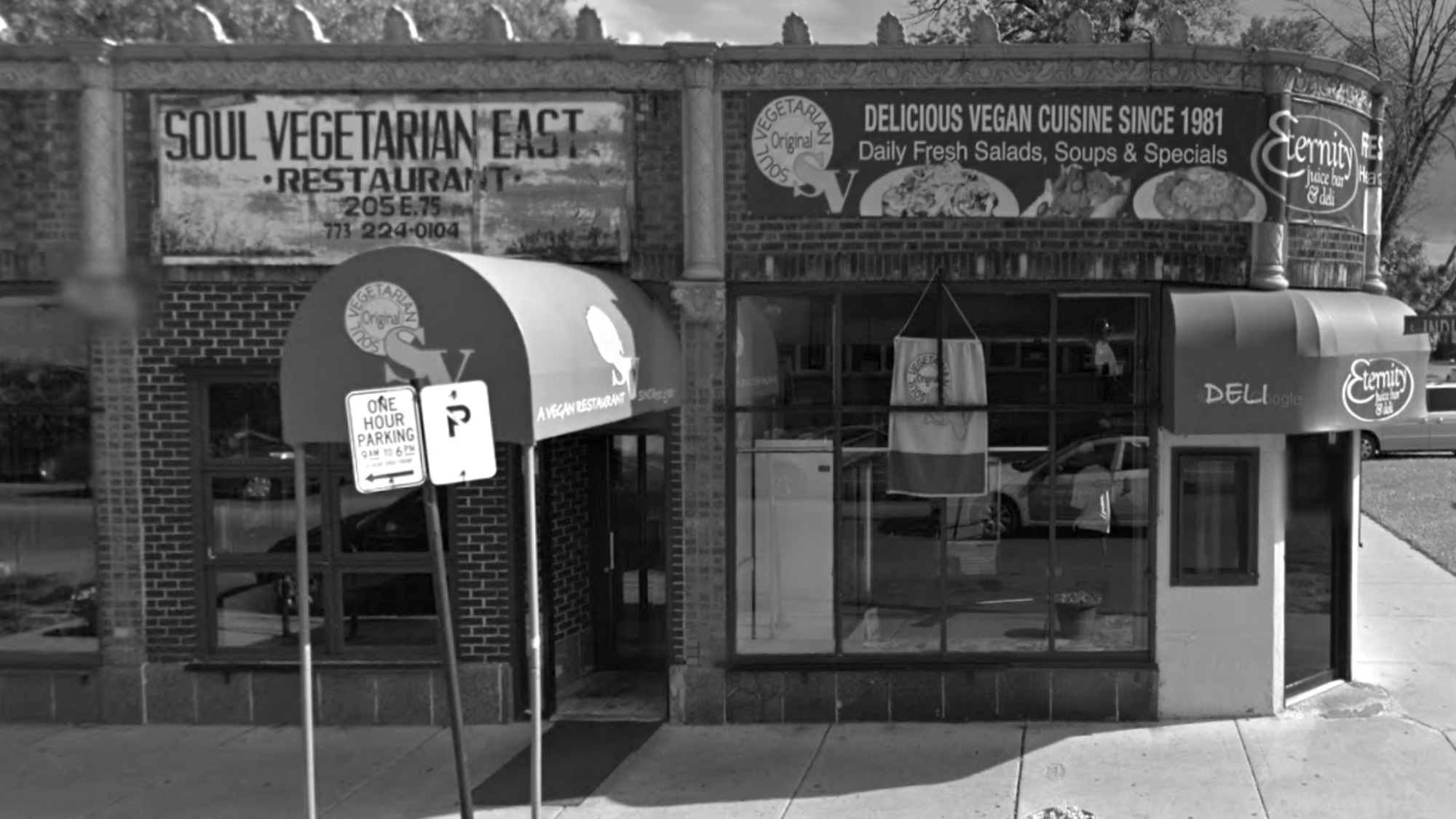
Original Soul Vegetarian: Proof That Divine Culinary Inspiration Can Grow on Trees
To the casual observer, Original Soul Vegetarian (a.k.a. “Soul Vegetarian East”), a Chicago restaurant with multiple locations across the country, seems like both a novelty and a contradiction. When people speak of “soul food,” a traditional African American cuisine, they often show a lot of love to meat dishes like fried chicken, fried fish, and smothered pork chops. As a result, the thought of soul food without meat, especially some sort of pork, seems oxymoronic. Original Soul Vegetarian is an iconic restaurant because, for 33 years and counting, it has successfully showcased soul food’s deep roots in plant-based cuisine.
- Tear Down the Restaurant Industry? Virtue’s Erick Williams Would Rather Lead By Building From Within
- An Ode to Chicken Vesuvio, the Ultimate Expression of Chicago
- The Layered Legacy of Roscoe’s House of Chicken & Waffles
- Soul Survivor: The Story of the World’s Oldest Soul Food Restaurant
- Remembering Atlanta’s Bygone Black-Owned Restaurants
- Black-Owned Restaurants Shaped Atlanta. Now, Their Survival Is More Important Than Ever.
In the beginning for Original Soul Vegetarian is the African Hebrew Israelite Community of Jerusalem religious movement, which began in 1966 Chicago after founder Ben Ammi Ben-Israel (born Ben Carter) said he received a vision. One of several religious groups that fall under the umbrella category of Black Hebrew Israelites or Black Hebrews, followers of this religion believe that African Americans belong to a lost sect of ancient Israelites. Ben-Israel devoted his life to spreading this teaching and leading African Americans to Israel, and he ultimately repatriated 350 African Americans to that country in 1969. Though some Black Hebrew Israelites groups have been designated as antisemitic by watchdog groups, Ben-Israel’s group has been legally recognized by Israel’s government since the early 1970s.
Through his teaching, Ben-Israel sought to transform, or decolonize, the traditional African American diet. “We were conspiring against ourselves, with the heavy carbohydrates, heavy salt. What was soul food, actually was killing us physically,” Prince Asiel Ben-Israel, the restaurant’s owner and international ambassador for the Black Hebrews, told the Chicago Sun Times in 2007. African Hebrew Israelites believe the prescription is a diet on Biblical scripture. Genesis 1:29 of the Hebrew Bible, called the Old Testament by others, indicates “God also said: ‘See, I give you every seed-bearing plant all over the earth and every tree that has seed-bearing fruit on it to be your food.'” African Hebrew Israelites interpret that verse as a divine mandate to veganism.
When Original Soul Vegetarian opened in the late 1980s, a no-meat, no-dairy menu was a definite anomaly for a restaurant in a predominantly Black South Side of Chicago. The restaurant thrived because it served good, affordable, plant-based food to diners who wanted to break from the convenience food, fast food, and traditional food options usually available in Black neighborhoods. The restaurant’s menu also resonated because vegetables have long been the building blocks of African American cuisine.
African American vegetarianism is a culinary legacy from West Africa, a part of the world where most black people living in the U.S. trace their heritage. As Fran Osseo-Asare explains in her book, “Food Culture in Sub-Saharan Africa”: “In West Africa, the basic meal pattern includes a filling starch carbohydrate such as rice, or a stiff porridge-like substance from corn or a grain such as millet or sorghum, or boiled and pounded root vegetables such as yam or cocoyam, accompanied by a thick soup, stew or sauce.” The soup, stew, or sauce is often a rich combination of meat and vegetables like dark leafy greens, beans, chiles, eggplant, okra, and seeds. Meat, usually dried, salted, or smoked, adds dimension, but it’s usually to season the vegetables. The vegetables frequently get the starring role at meals. Meat only gets that kind of attention on special occasions.
On this side of the Atlantic Ocean, enslaved Africans, and later enslaved African Americans, in the American South took a similar approach to meals. In this case, slaveholders exerted power by controlling the amount and type of food that enslaved people received on a weekly basis. It was often five pounds of some sort of starch (cornmeal, rice, or sweet potatoes), a couple of pounds of dried, salted, or smoked meat (typically pork, but beef or fish was used if cheaper), and a jug of molasses. Other than that, the enslaved strategized to supplement their diet. They did so by fishing, foraging, hunting, and gardening during their leisure time. Similar to their ancestors in West Africa, enslaved African Americans usually ate seasonal vegetables with some meat used for seasoning. Only when the work schedule slowed (e.g., weekends and special occasions) did they get more access to the meat dishes and glorious desserts that now typify soul food.
After Emancipation, African Americans, especially those living in the rural South, subsisted primarily on vegetables because they couldn’t afford meat. The same was true of the millions of poor Blacks who traveled to urban centers outside of the South, a decades-long phenomenon often dubbed the Great Migration. In their new homes, they often struggled with food insecurity, and meat was a luxury item consumed in small amounts until they prospered. Many African American restaurants that opened during this time period included an all-vegetable plate on their menu to feed their low-income patrons. Many times, such vegetable plates were more aspirational than technically vegan or vegetarian because the restaurant cooks used salted or smoked pork and turkey parts to season the vegetables. Soul Vegetarian took this restaurant tradition to the next level by eliminating meat and animal products, and offering soybean and wheat gluten substitutes instead.
View this post on Instagram
With its emphasis on veganism, Original Soul Vegetarian truly seems to care about its customers’ health. “We’re not here to make money. We’re here to teach the community how to eat,” Brother Urie-Ben Israel told an Atlanta newspaper in 1979. Also, much of what they do shows a concern for their patrons’ souls by way of a spiritual connection to the African diaspora. On the menu, a bowl of groundnut soup transports to West Africa. The next stop could be the Caribbean with some seasoned tofu called “jerkfu.” Next up is the American South with well-seasoned side dishes like collard greens and southern-inspired desserts like vegan sweet potato pie and caramel cake. Even barbecue gets a shout out with various soy or wheat gluten slathered in barbecue sauce. In addition, a 1986 restaurant review In the Chicago Tribune noted “color photos of Africa decorate the walls and waitresses in regal-looking headdresses and sun-bright native dresses glide between tables. Next door, a boutique features African artifacts.”
Let’s be clear though. To this religious community, it’s Israel, not Africa, that is the ultimate motherland. Thus, the Middle East does get its nod on the menu as well. Falafel, seasoned ground chickpea fritters, are a popular item as well as gyros made from a soy product called Textured Vegetable Product (TVP). At Original Soul Vegetarian’s affiliate restaurant in Atlanta, the restaurant’s owners have developed “kalebone” as an alternative to TVP. Kalebone is a seasoned, wheat-gluten substitute made at the restaurant. The result, a viable vegetable alternative to the gyro, is one of the restaurant’s biggest sellers, according to manager Yafah Israel.
Original Soul Vegetarian restaurant has had an enduring influence on Chicago’s dining scene and that of other cities around the world. At various times, Soul Vegetarian restaurants have opened and operated in Atlanta, Georgia, Baltimore, Maryland, Charleston, South Carolina, Tallahassee, Florida, Washington, D.C., and Tel Aviv in Israel. They’ve shown that a Black-owned restaurant featuring plant-based cuisine can be popular and profitable.
Today, fueled by consumer desire for healthier eating options, vegan and vegetarian food are two of the hottest trends in African American cuisine. The amount of creativity coming from African American plant-based chefs like Bryant Terry (“Afro-Vegetable Kingdom”) and Jenne Claiborne (“Sweet Potato Soul”) is stunning, and there’s certainly more to come. Terry acknowledges that Soul Vegetarian was definitely an influence. “[It was] a major pull factor for me when visiting Atlanta in college.” For Terry and countless others, we can thank the Original Soul Vegetarian Restaurant for paving the way — or better yet, planting those culinary seeds.
Original Soul Vegetarian: 205 E 75th St., Chicago. (773) 451-9796 or www.originalsoulvegetarian.com
Adrian Miller is a James Beard Award-winning author who has written about African American presidential chefs, barbecue, and soul food. He lives in Denver, Colorado.
Sources:
Curtis, Lawrence, “Finding a Home in the Promised Land,” Chicago Sun Times, Aug. 21, 2003, p. 6
Donovan, Lisa. “Religion, food choices go hand in hand at restaurant.” Chicago Sun-Times (IL), May 16, 2007: S1
Original Soul Vegetarian Restaurant website, https://www.originalsoulvegetarian.com/
Osseo-Asare, Fran, Food Culture in Sub-Saharan Africa, Greenwood Press, 2005, p. 28.
Sheridan, Margaret, “Soybean is King at Soul Vegetarian,” Chicago Tribune, Feb. 7, 1986, p. 22.
Soul Vegetarian: A New Option for a Great Meal, University Wire, Feb 6, 2014.
Wohlwend, Chris, “Pick a pocket of portable pita: It’s low in fat,” Atlanta Journal Constitution, Aug. 17, 1992, p. 18.















